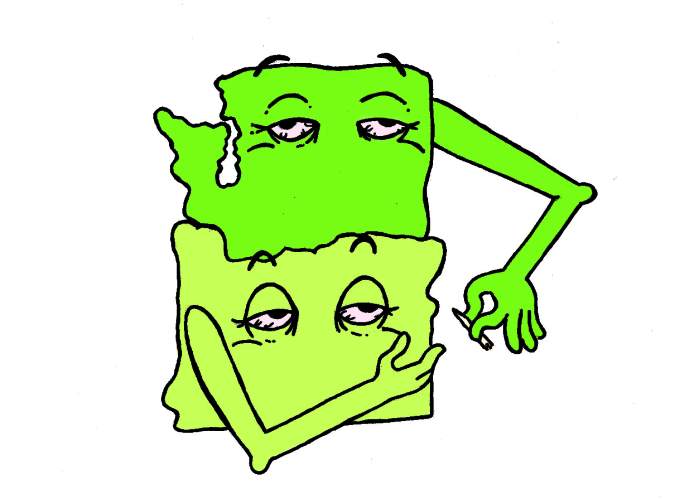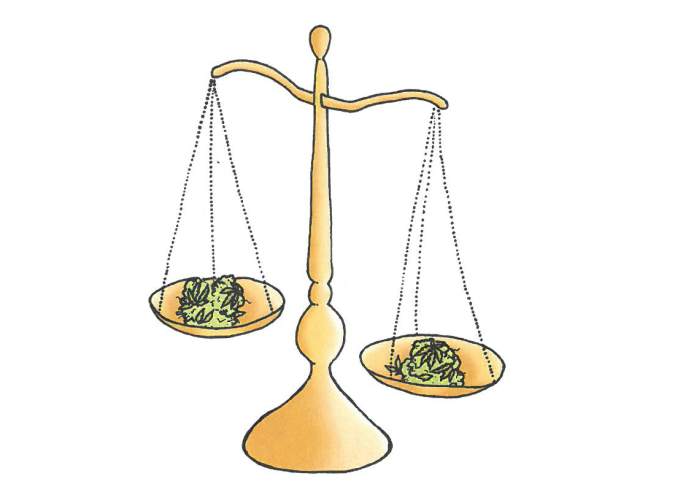Answering questions from the mail baggie.
We asked you to send in your canna-questions, and now it’s time to answer some reader mail! (The Higher Ground legal staff has asked me to remind readers that answers provided herein should be taken with a grain of hempseed; I am, after all, a marijuana columnist.)
With wildfires all over the state, I’m worried a nearby marijuana field may catch on fire and get me and my family stoned. Can burning weed farms get people high? Lance, Chelan
Does Smokey the Bear crap in the woods? Yes! Look, if you are standing right next to a giant burning pile of ganja and you inhale the smoke, you will be stoned to the bejesus. A town in Indonesia got seriously baked after police there burned a three-ton mound of confiscated marijuana in March. Dozens of residents of Tangerang (about 20 miles from Jakarta) complained of severe headaches and dizziness after inhaling smoke from the bud barbecue.
In the event, however, you’re not standing right next to giant bales of burning herb, it’s unlikely your family will catch a contact high from wildfires of marijuana plants. According to a study in Drug and Alcohol Dependence (great centerfold last month, btw!), secondhand smoke can get people feeling stoned, but it takes a huge amount of THC for that to happen.
“We evaluated the conditions under which you’d need to be to get intoxicated from secondhand smoke exposure,” noted Ryan Vandrey, an associate professor in the Department of Psychiatry and Behavioral Sciences at Johns Hopkins University, “and it needs to be very extreme.” In their study, researchers put a dozen students in a small Plexiglas chamber without ventilation and gave three-quarters of them joints to smoke. “Enough smoke from the room filtered out so that the nonsmokers stuck in the ‘hot box’ didn’t experience a buzz,” Vandrey said. “Outside, where there is a constant circulation of air, it’s hard to imagine that a person could breathe in enough marijuana smoke to feel the effects of the drug.” (Bummer—though I am enrolling next semester at John Hopkins!)
Ultimately, if you’re worried about that kind of fire getting the wife and kids high, you’re worrying about the wrong thing: Get the hell outta Dodge, man! Smoke inhalation of any kind is serious in mega-quantities, and fumes from burning gas, plastics, pesticides, household products, and clouds of soot and ash can also do serious damage to your lungs.
I read somewhere that they’re starting to make GMO marijuana! Is that true, and how can I make sure I’m not smoking Frankenbud from Monsanto! Erin, Wallingford
While rumors of genetically modified weed have been around for decades, at least for the moment it’s a paranoid fantasy. “Genetic modification or genetic engineering involves altering a substance’s DNA at the molecular level,” the website PolitiFact explains. “Producers of marijuana on the illicit market don’t have the ability to pull off those kinds of lab-based modifications.”
Modern-day Reefer Madness proponents like Patrick Kennedy are also feeding the Frankenbud fires, claiming that GMO pot is being used to hard-wire megadoses of THC into the plant. While many growers (both legal and black-market) are selecting and breeding the best plants and coming up with high-potency strains of cannabis, thus far Big Ag players like Monsanto and company have yet to get their hands on seeds (one of the very few advantages of marijuana not being legal at the federal level).
Of course, given that cannabis is a cash cow (estimated to be a $15 billion market by 2020), the corporate agro-bastards at Monsanto will jump in at some point. It’s part of the reason the independent-grower model in early-legalization states like Washington, Oregon, and Colorado is so important—local, non-corporate farmers have got a headstart and a fighting chance!
You constantly mention how much in taxes legal pot is bringing in for the state, but obviously it also means there’s a ton more weed out there. So now all our kids are going to be getting their hands on the stuff and smoking up nonstop. Great job, Stoner-Dickwad . Derrick, Des Moines
I’m not sure there’s a question in there, Derrick, but I’d like to refute the statement.
According to data from the Washington Institute for Public Policy, the use of cannabis by youngsters in our state has remained unchanged over the past decade. “Cannabis use and access among students in sixth through 12th grades have changed little from 2002 through the most recent survey in 2014.” The report went on to state that all the groups surveyed—sixth graders, eighth graders, 10th graders, 12th graders—demonstrated static use over time, with the oldest group actually reporting slight declines in lifetime use since 2002.
Of course, Initiative 502 passed in 2012 and retail sales didn’t start until July 2014, so those numbers may change. However, eighth graders who were asked about their use of pot in the past month (as well as lifetime use) reported that they’d not only smoked less since legalization, but that it was harder to get. Unlike black-market dealers (who’ve been around for decades), our new crop of legal recreational cannabis stores actually checks IDs.
Last but not least, Derrick, I can tell you who is getting their hands on more reefer—full-grown adults. Since it became legal here, self-reported use is up 17 percent between 2012 and 2014. So yes, great job stoner-dickwads, indeed!





